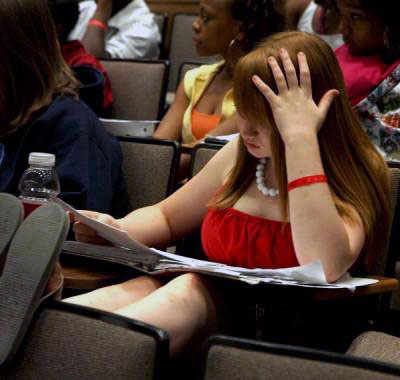All Nonfiction
- Bullying
- Books
- Academic
- Author Interviews
- Celebrity interviews
- College Articles
- College Essays
- Educator of the Year
- Heroes
- Interviews
- Memoir
- Personal Experience
- Sports
- Travel & Culture
All Opinions
- Bullying
- Current Events / Politics
- Discrimination
- Drugs / Alcohol / Smoking
- Entertainment / Celebrities
- Environment
- Love / Relationships
- Movies / Music / TV
- Pop Culture / Trends
- School / College
- Social Issues / Civics
- Spirituality / Religion
- Sports / Hobbies
All Hot Topics
- Bullying
- Community Service
- Environment
- Health
- Letters to the Editor
- Pride & Prejudice
- What Matters
- Back
Summer Guide
- Program Links
- Program Reviews
- Back
College Guide
- College Links
- College Reviews
- College Essays
- College Articles
- Back
School Systems and Education
Schools are venues for learning. Due to the current school system, a majority of kids no longer view it as the place to learn, make connections, or to establish a balance between their social and academic lives. According to the Education Commission, “Some 385 million youth are at risk of not having the skills necessary to fill jobs in 2030.” This makes it difficult to believe that the existing school system works to the best of its ability. Throughout the world, education systems vary and so do their required standards. Although school intends to benefit and hopes to prepare students for success in both their careers and as a citizen, this vision is commonly lost in translation.
The idea of work plays a role in a majority of educational discussions practically under the term, “career readiness.” Parents and students widely misinterpret this term as it is implied that the purpose of schooling is solely for preparation for the future. Because of this system, teachers view students as test takers and grade makers. It is frustrating at the very least; grades actually have a very minuscule effect on learning. In schools today, topics tend to be taught the same way: instructors break up courses into subtopics and teach them at different times until they cover all needed material. Because of the gap between lessons, small groups of details do not usually fit together when trying to create the whole picture of new material. This makes learning much more challenging for students, producing results that teachers should strive to avoid. While studies of how the brain functions when learning have progressed enormously, ways of measuring intelligence have remained the same. It is no secret standardized tests have engulfed the entire system - so much that they have become the indicators of school. Many people believe that this very outdated system causes more harm than the benefits provided. The tests appear ‘standardized’ because all students answer the same questions under corresponding orders, and educators use the measured criteria to score their tests. The test scores stand far from accurate when predicting how students will perform later in life. Because many children go through years of school following orders and instructions, the work feels separated from the real world.
To prepare students for life outside of school, educators need to raise children who can discover meaning within their education. By giving students the opportunity to learn through authentic, and relevant educational experiences, teachers are providing them with the chance to apply their knowledge to the real world. This allows students to demonstrate their abilities, adapt and change, and form the habits required to succeed in their lives beyond school. As well as Brain-based learning; addresses the specific needs of students’ brains in order to maximize learning but has not been implemented in a majority of schools.

Similar Articles
JOIN THE DISCUSSION
This article has 0 comments.